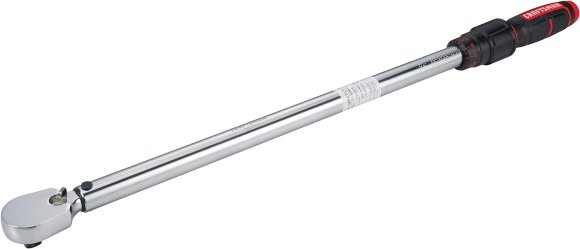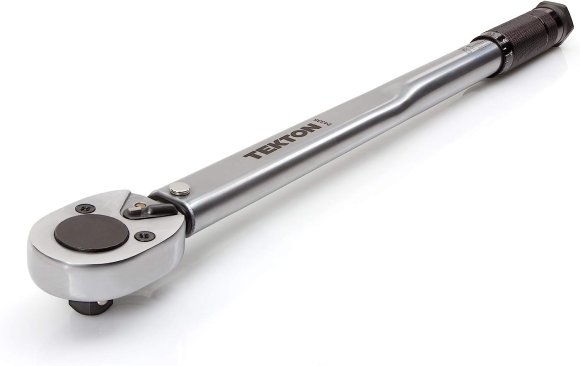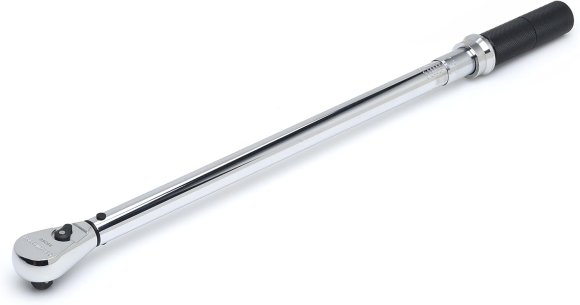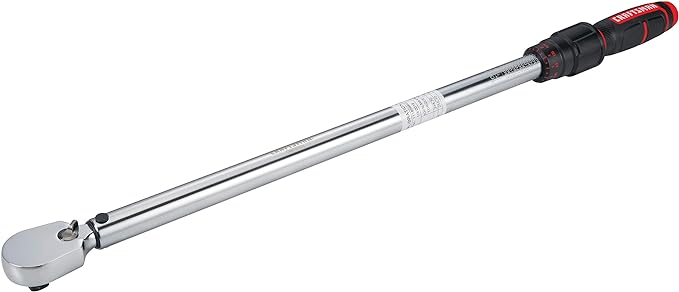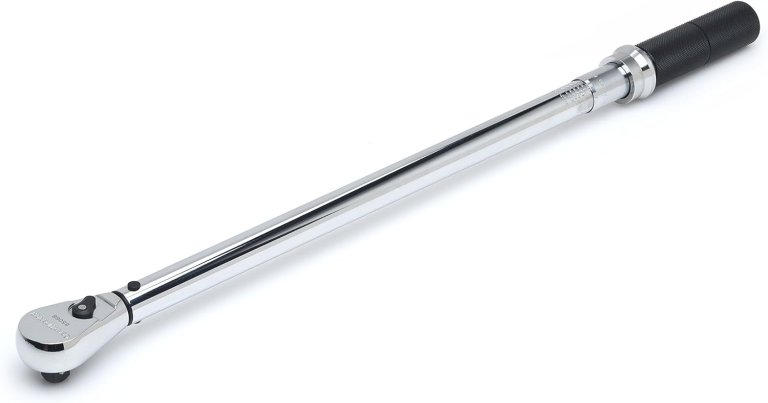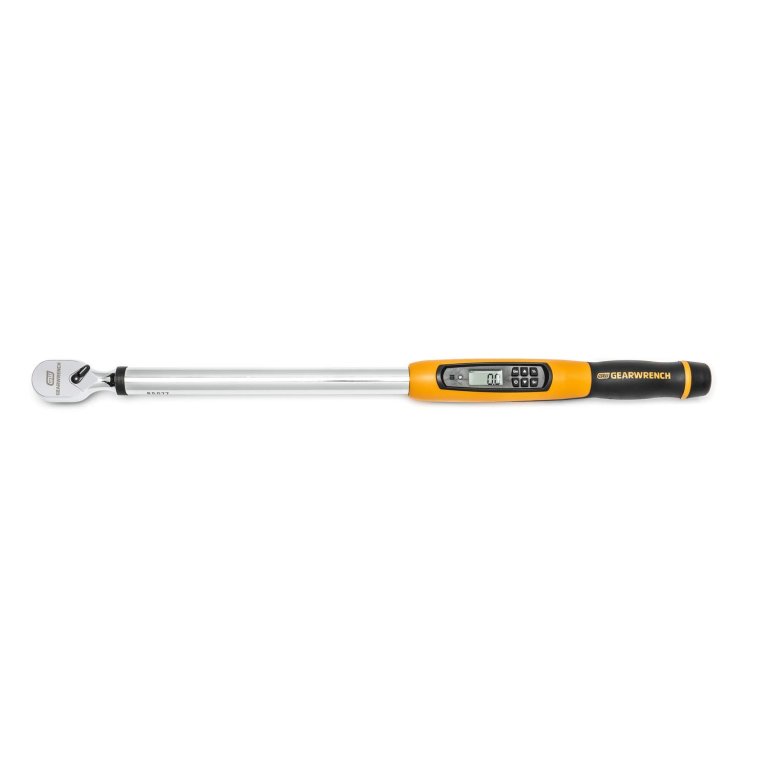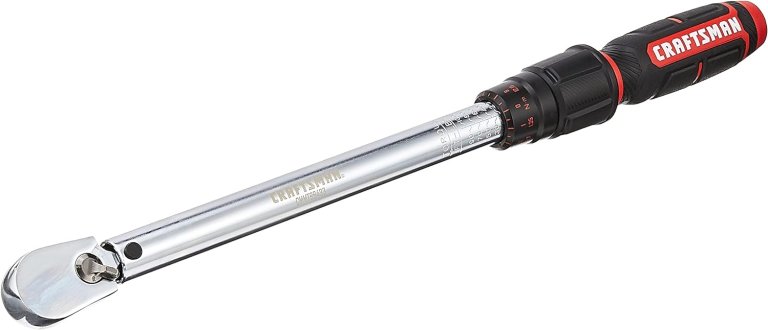We may earn revenue from the products available on this page and participate in affiliate programs. Learn more ›
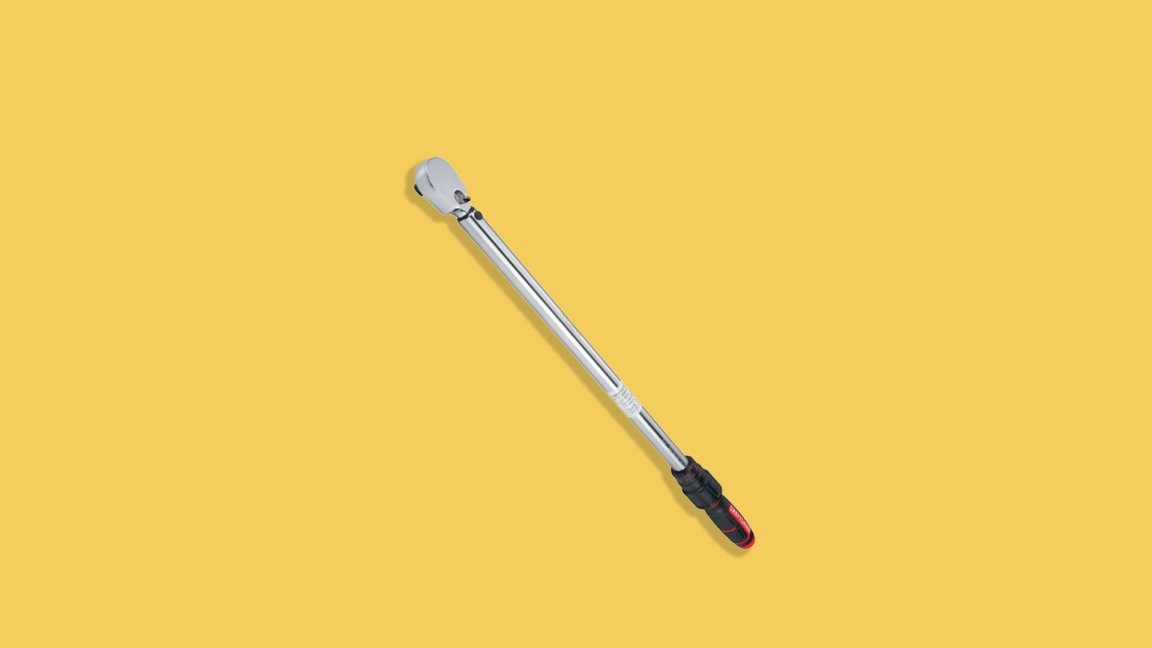
You really do need a torque wrench. Any fastener you come across has a designated torque spec you ought to tighten it to. Now, I can’t pretend to be the person who torques everything to spec. I have learned that cranking down on bolts until I hear the crack and then backing off a quarter turn is no way to do things either. Still, any time I’m working on a fastener in a tolerance-sensitive setting or that my life depends on, I bust out a torque wrench.
The question isn’t if you should do the same, but which torque wrench you need to get it done. That’s what I’m here to help you figure out.
Summary List
- Best Overall: Craftsman Half-Inch Click Torque Wrench
- Best Value: Tekton Half-Inch Drive Click Torque Wrench
- Honorable Mention: Gearwrench Half-Inch Drive Micrometer Torque Wrench
- Best Digital: Gearwrench Half-Inch Drive Electronic Torque Wrench
- Best for Small Fasteners: Craftsman 3/8-Inch Micrometer Torque Wrench
- Most Advanced: ACDelco ARM601-4 Heavy-Duty Torque Wrench
Our Methodology
The whole reason to buy a torque wrench is that your projects demand a certain level of accuracy from you and your tools. You can’t trust just anything, or you might wind up with a rod coming through the side of the engine block or a wheel taking a solo ride down the freeway. That’s why I won’t recommend just anything to you. These torque wrenches are those I trust or those I know to trust based on research into quality, accuracy, and reliability. Even so, you should take the time to do your own homework to find what works for you.
Best Torque Wrenches: Reviews & Recommendations
Best Overall: Craftsman 1/2-Inch Torque Wrench
Pros
- Great torque range for automotive projects
- Comfort grip feels good in the hand
- Length makes easy work of reaching high torque settings
- Lifetime warranty
Cons
- Clumsy adjusting mechanism
- Socket retention can see some improvements
This Craftsman torque wrench is one I’ve been using regularly since my hands-on review of it. It’s seen everything from chassis to engine work and is one of the first tools I grab before any big job. The torque range is perfect for a wide variety of automotive tasks, it feels great in the hand, and it sits at an attainable price for most DIYers. Its length can be an issue in tight spaces, but it’s certainly something you will appreciate when tightening fasteners down north of 150 pound-feet. Also, it’s a Craftsman, and that lifetime warranty is hard to ignore.
The adjusting system, however, is designed to be straightforward with the use of a spring-loaded locking collar as opposed to a jam nut. It’s great for quick adjustments but can be awkward when making big changes in the torque settings. Also, sockets tend to come loose fairly easily and that can become an issue in tight spaces.
Best Value: Tekton Half-Inch Drive Click Torque Wrench
Pros
- Affordable
- Quality surpasses expectations
- Lifetime warranty
- Easily reaches max torque setting
Cons
- Low tooth count
- Finish wears easily
The Tekton Half-Inch Drive Click Torque Wrench provides excellent visual and tactile feedback when in use, and the value proposition is strong. The all-steel construction helps ensure longevity, and Tekton says there are no plastic parts to wear out over time. Tekton includes a storage case and a handy torque conversion chart as well.
Reviews for the Tekton are overwhelmingly positive, and focus on the wrench’s unfailing reliability. Though the brand’s torque wrenches are not the cheapest, there’s a great deal of value in the price. Even so, the price is more than justified by the wrench’s outstanding performance and durability.
Honorable Mention: Gearwrench Half-Inch Drive Micrometer Torque Wrench
Pros
- High quality
- Priced well
- Great torque range
- Good length
Cons
- Click can be missed
- Short warranty
The Gearwrench Half-Inch Drive Micrometer Torque Wrench offers a huge torque range and incredible quality. Starting with the 30-250 pound-feet torque range, you’ll be hard-pressed to find a fastener this won’t work for. The length makes it easy to hit those high settings, and its knurled handle ensures you won’t lose your grip. This is a Gearwrench tool, so the quality is much better than most in its price range, which is within reason for most DIYers.
As great as Gearwrench tools are, there are downsides. In this case, the short warranty is enough to scare off many wrenchers. The clicking mechanism can also see some improvement. It’s on the faint side and can be easily missed if you’re not careful.
Best Digital: Gearwrench Half-Inch Drive Electronic Torque Wrench
Pros
- Easy to use
- Quality construction
- Works well in tight spaces
- Affordable price range
Cons
- Some quality control issues
- Short warranty
Gearwrench is going back to back with this electronic torque wrench. As an electronic option, the convenience factor is hard to ignore, but the fact that it buzzes, vibrates, and uses an LCD display to indicate you’ve reached spec separates it from many. On top of that, it has a 72-tooth ratcheting mechanism with a swiveling head, helping it to shine in tight spaces. Since it’s Gearwrench, you already know the quality is there to ensure those gadgets and gizmos are worth getting excited for. It’s also important to note that it’s priced only slightly above its mechanical counterpart despite being a step up in many ways.
Quality control is something of an issue, as a few reviewers received wrenches with missing parts. Also, the warranty is a little short.
Best for Small Fasteners: Craftsman 3/8-Inch Micrometer Torque Wrench
Pros
- Affordable
- Quality design
- Comfort grip
- Lifetime warranty
Cons
- Clumsy adjustment mechanism
- Socket retention needs improvement
Craftsman’s 3/8-inch torque wrench is a great option for dealing with intake manifolds and other components that don’t require you to move the earth with torque. Being a scaled-down version of the top pick, all of the good carries over. It’s affordable, backed by a warranty that’s hard to top, and the quality is better than most of the competition. It’s also working the comfort grip that you’re sure to appreciate when your hands are tired from all those sharp edges and harsh chemicals.
Unfortunately, the same clumsy adjustment system also carries over, as does the minor issue with socket retention. It’s hard to qualify either as a real issue since neither keeps this tool from performing.
Most Advanced: ACDelco ARM601-4 Heavy-Duty Torque Wrench
Pros
- Powerful and feature-rich
- Durable and well constructed
- Works well in a variety of settings
Cons
- Complicated
- Storing torque settings is a pain
Basic torque wrenches get the job done just fine, but sometimes you need the accuracy and confidence of a digital wrench. The ACDelco ARM601-4 offers multiple settings, functions, and torque specifications. The company advertises a torque range of 10-100 pound-feet, and claims that the wrench remains accurate and powerful at lower settings.
Customers love the ACDelco digital wrench, but many state that it can be complicated to use. Its battery cover can be difficult to remove, and some note that the wrench can be difficult to set and store torque specs.
Our Verdict on the Best Torque Wrenches
If I could only recommend one, the Craftsman Half-Inch Click Torque Wrench would be the one. The range, quality, price, and warranty are all exactly what I expect of a torque wrench I use on my own car. However, that Tekton Half-Inch Drive Click Torque Wrench is really hard to beat if you’ve only got a few dollars to spend.
Types of Torque Wrenches
Click
The most common option is a click-type torque wrench. You set the torque specification, generally by adjusting the scale on the handle, and once you tighten a fastener to the specified torque, you will hear and feel a click. Exactly how you set the torque specifications depends on the manufacturer’s design, but all work on the same basic principle.
Beam
Beam-style torque wrenches aren’t quite as common as the other two main types talked about here. These wrenches have a beam or bar that runs the length of the tool from the head to just above the handle at a scale. As force is exerted onto the handle, that bar will move along the scale to tell you how much torque is being applied to the fastener. A dial-type torque wrench works similarly, only with a dial rather than a bar. Neither of these is your best choice for general DIY repair work.
Electronic
An electronic torque wrench is basically the leveled-up version of the click type. Instead of having to manually crank the handle while reading the scale, you simply set the desired torque setting on the digital display. When you tighten a fastener to that setting, a beep will sound. You can sometimes watch the torque setting on the digital readout as well. These are usually more expensive than click-type torque wrenches, but the convenience is well worth it.

Key Features
Torque Range
Each torque wrench is going to have a set range of torque readings. Make sure whatever you’re considering will work with the project at hand. Keep in mind that some are designed specifically with smaller fasteners and low torque settings, while others focus more on large fasteners and high torque. The torque reading itself is also a detail to be aware of. Inch-pounds, pound-feet, and Newton meters are the most common readings you’ll be supplied with, and you have to pick a torque wrench with the appropriate increments.
Size
A longer handle makes it easier to reach higher torque settings and is something you will appreciate when you need to crank down on fasteners. However, on smaller fasteners with lower torque settings, a shorter handle can keep you from over-torquing. The size will determine where you can feasibly use a torque wrench. It’s not a bad idea to invest in multiple torque wrenches to ensure you can properly address all torque specifications on a given vehicle.
Pricing
Pro-level torque wrenches for automotive use generally run between $350 and $500. If you’re using your tools to make a living or want the best of the best, that’s about what you can expect to spend. That does not mean you can’t land a really solid torque wrench for $100-$200. Most DIYers spend about that. There are many options for less than $100, and some are good for the money. However, it’s essential to do your research to make sure you’re buying the right one for you.
FAQs
You’ve got questions. The Drive has answers.
A: Yes. Most lug nuts are to be fastened to around 100-140 pound-feet, which can be done with the supplied tire iron in your vehicle. It is a good idea to go over the lug nuts with a torque wrench when possible to ensure you’re within spec.
A: Yes, but you shouldn’t. Fasteners often require a ton of force to break loose, and exceeding the max torque load of a torque wrench can damage it. So, even if they can handle loosening, the potential to do harm and throw off accuracy isn’t worth it. It’s best to reserve the tool for tightening.
A: Yes. If you’re into the engine, transmission, differential, or anything else in the driveline, you must have a torque wrench on hand, since most parts rely on precision assembly. You’ll also run into critical fasteners throughout the suspension and chassis.
